Travel Sickness
Travel sickness medicines alleviate the symptoms of motion sickness that some individuals experience during car rides, flights, boat trips, or other modes of transportation. This category includes tablets, patches, and liquids containing active ingredients such as Hycosine and Promethazine. Read More…

-
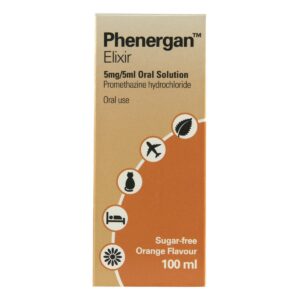
Phenergan Elixir (5mg/5ml Promethazine) Sugar Free Oral Solution 100ml
- Driving licence AND passport ID required to purchase this product
- REFUNDS ARE SUBJECT TO A £5.00 ADMINISTRATION FEE IF ID CAN NOT BE PROVIDED.
- MULTIPLE ORDERS WILL BE SUBJECT TO A £5.00 ADMINISTRATION FEE WITH NO EXCEPTIONS.
£16.49 Select options -
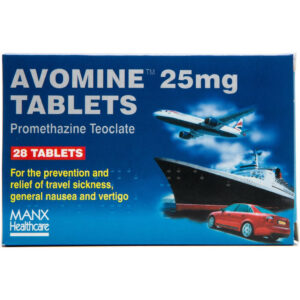
Avomine 25mg Tablets
- Stops & Prevents Travel Sickness
- Active Ingredient: Promethazine
- Buy With Confidence From UK Registered Pharmacy
£2.60 – £7.60 Select options -
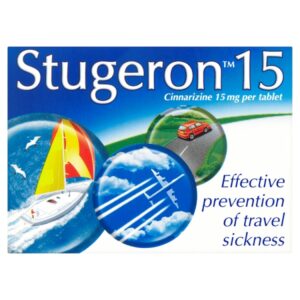
Stugeron 15 Tablets
- Effective Travel Sickness Prevention
- Blocks Nerve Messages To The Brain
- Active Ingredient: Cinnarizine
£4.79 Select options -
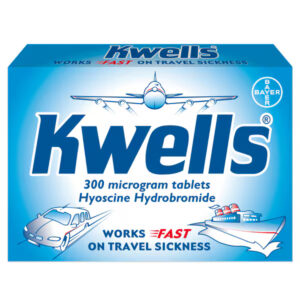
Kwells Tablets – 12 Tablets
- Active Ingredient: Hyoscine Hydrobromide
- Next Day Delivery Available At Checkout
- Buy With Confidence From UK Registered Pharmacy
£2.99 Select options -
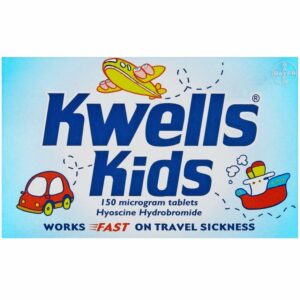
Kwells Kids Chewable Tablets – 12 Tablets
- Effective Relief From And Prevention Of Travel Sickness
- Suck, Chew Or Swallow
- Active Ingredient: Hyoscine Hydrobromide
£2.89 Select options -
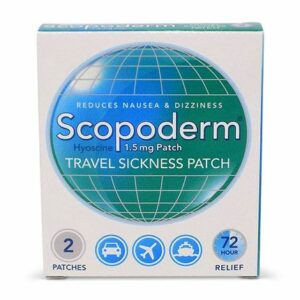
Scopoderm Patches 1.5mg
- Active Ingredient: Hyoscine
- Prevents symptoms of motion sickness and nausea
- Each patch lasts for 72 hours
£23.15 Select options -
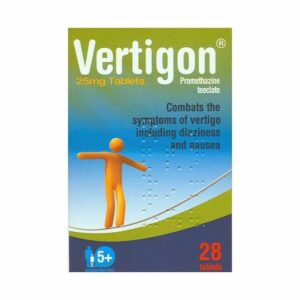
Vertigon 25mg Tablets – 28 Tablets
- Combats the symptoms of vertigo including dizziness and nausea
- Active ingredient: Promethazine
- Anti-emetic
£6.89 Select options -
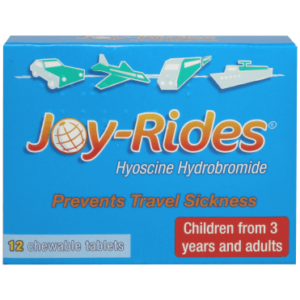
Joy-Rides Travel Sickness Tablets – 12 Tablets
- Prevents Travel Sickness
- Next Day Delivery Available
- Buy With Confidence From UK registered Pharmacy
£7.19 Select options
-
About
Travel sickness medicines are used to prevent and treat the symptoms of motion sickness, a common condition that causes nausea, vomiting, dizziness, sweating, and a general feeling of discomfort when one is moving. These symptoms occur when the inner ear, which helps control balance, sends signals to the brain that are different from what the eyes are seeing.
The most effective medications for preventing motion sickness are known as anticholinergics, with hyoscine (also called scopolamine) being widely recognized for its effectiveness. It works by blocking the confusing nerve messages between the inner ear and the brain. It’s available in various forms, such as tablets and patches, and is best taken before the start of a journey. However, it can cause side effects like dry mouth, drowsiness, and blurred vision, which could impair your ability to drive or operate machinery.
Another common class of medications used for motion sickness includes antihistamines like cinnarizine and promethazine. These are effective but can also cause drowsiness, and it’s important to consider this if you need to remain alert.
When considering travel sickness medications, it’s crucial to think about the balance of their benefits in preventing discomfort against the risks of side effects. In some cases, the side effects might influence your choice, especially if you need to be active and focused after travel.
-
Symptoms
Travel sickness, commonly known as motion sickness, can cause a range of symptoms that affect individuals when they’re traveling by car, boat, plane, or train. These symptoms arise from a sensory mismatch, where the inner ear senses movement that the eyes may not see, sending conflicting signals to the brain.
The symptoms include a feeling of dizziness or lightheadedness, nausea, and vomiting. Additionally, sufferers may experience headaches, become pale, and break out in cold sweats. Increased saliva production is another common symptom. Many people also report feeling fatigued, irritable, and unable to concentrate, and may exhibit rapid breathing or a feeling of needing to gulp for air. Generally, symptoms can resolve shortly after the motion stops, but in some cases, they may persist for hours or even days after travel.
For those who frequently experience travel sickness, it is recommended to take motion sickness medicine one to two hours before traveling, as these can prevent the onset of symptoms or alleviate them if they occur. Hyoscine is a widely used medication for preventing travel sickness due to its efficacy in disrupting the confusing nerve messages sent to the brain. Antihistamines, while not as effective as hyoscine, can also be useful, but it is important to be aware that they can cause drowsiness. The selection of medicine should be based on the balance of benefits and side effects, taking into account the individual’s particular circumstances and health conditions.
For persistent or severe symptoms, consulting a healthcare provider is advisable, as they can recommend specific treatments and check for other underlying conditions.
-
Diagnosis
Motion sickness is usually diagnosed based on a person’s symptoms and the circumstances in which they occur. The process typically involves a discussion with the patient about their history with motion sickness and the specific scenarios that trigger their symptoms. In many cases, if the patient has a history of motion sickness and presents with typical symptoms, no further evaluation may be needed. However, if a person suddenly becomes prone to motion sickness without a prior history, or develops symptoms when not in motion, or if there are additional concerning symptoms like hearing loss, blurred vision, or difficulty with coordination, further diagnostic tests, such as blood tests, urine tests, and imaging tests like X-rays, CT scans, or MRIs, might be recommended. A thorough physical examination of the ears, nose, and throat, as well as testing balance, hearing, vision, and nerve function, will also be conducted.
It’s important to note that other conditions can sometimes mimic motion sickness, so a healthcare provider will work to rule out other possible causes of the symptoms, such as ear infections or other vestibular disorders, before confirming a diagnosis of motion sickness. The distinction between the dizziness of motion sickness and true vertigo (which is often seen with vestibular disorders) is also a critical part of the diagnosis, as true vertigo involves a sensation of spinning or motion and is not typically a feature of motion sickness.
-
Treatments
Over-the-counter medications can be a convenient and effective way to prevent and manage the symptoms of travel sickness, such as nausea, vomiting, and dizziness. We offer a range of products in our online pharmacy that can help with these issues.
Some over the counter medicines include:
Phenergan Elixir contains promethazine, which is an antihistamine that can help by blocking histamine and acetylcholine in the brain to prevent and treat the symptoms of motion sickness. It can cause drowsiness, so it’s often taken at night. It’s important to note that you should avoid alcohol while taking this medication, as it can increase the chance of side effects.
Avomine Tablets also contain promethazine and are effective for the prevention and treatment of travel sickness. Like other sedating antihistamines, they may cause drowsiness, so it’s recommended to take them before a journey to allow time for the effects to begin.
Stugeron Tablets have cinnarizine as their active ingredient, another antihistamine that is effective for travel sickness. It works by restricting the labyrinth’s function in the inner ear to control nausea, vomiting, and vertigo. Cinnarizine can also make you drowsy and should be taken a couple of hours before traveling for best results.It’s advised to avoid alcohol when taking these medicines. It’s always advisable to consult a pharmacist or healthcare professional before taking new medications, especially if you have not taken these medicines before, if you’re on other medications, or if you have underlying health conditions.
-
Prevention Strategies
Travel sickness, can significantly affect your comfort during travel, but there are several effective strategies to prevent or minimize symptoms:
Pre-Medication: Taking motion sickness medicine one to two hours before travel can prevent the onset of symptoms. Medications such as antihistamines and scopolamine are commonly recommended.
Choose the Right Seat: The choice of seat can make a big difference. In a car, the front passenger seat is ideal. On a boat, the middle part is best, and on a plane, sitting over the wing area helps. Always face forward and try to sit near a window to maintain a view of the horizon.
Visual Focus: Looking at a stable horizon or a distant object can help align your sensory perceptions and reduce the confusion that leads to motion sickness. Avoid reading or performing tasks that involve looking down while traveling.
Air Flow: Ensuring good ventilation and direct airflow can help alleviate symptoms. Use air conditioning or open windows in a car, and direct air vents towards you on a plane.
Dietary Considerations: Avoid heavy, spicy, or fatty meals before and during travel. Eating light, bland foods and staying hydrated with water is advisable. Avoid alcohol as it can worsen symptoms.
Physical Position: Lying down when feeling sick can help, as well as tilting your head into turns when in a vehicle, if possible. On a boat or cruise ship, reclining and stabilizing your body can also be beneficial.
Behavioral Techniques: Techniques like deep breathing, listening to music, or engaging in conversations can distract from the sensations of motion and help reduce symptoms.Always consider personal susceptibility and experiences with motion sickness when planning your travel to choose the best strategies for you.












